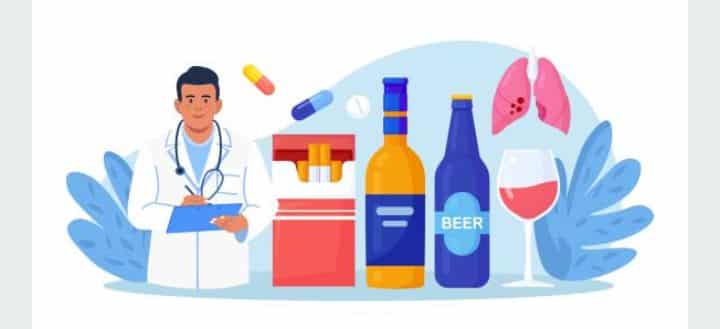Addiction is a chronic disorder characterized by the compulsive use of substances or engagement in behaviors despite harmful consequences. While commonly associated with drugs and alcohol, addiction extends to activities like gambling, gaming, and even food. With roots in both biology and psychology, addiction is complex, affecting millions of people worldwide. This article explores the causes of addiction, its effects on individuals and society, and the pathways to recovery.

The Nature of Addiction
At its core, addiction alters brain chemistry, particularly in the regions associated with reward and pleasure. The brain’s reward system, which releases dopamine in response to pleasurable stimuli, becomes hijacked by addictive substances or behaviors. Over time, the individual’s brain adapts to excessive dopamine release, reducing sensitivity and increasing tolerance, requiring more of the substance or behavior to achieve the same effect. This shift is often what drives continued use despite knowing the negative consequences.Addiction is categorized into two broad types:
Substance Addiction: This includes dependence on drugs like alcohol, nicotine, opioids, and other illicit drugs. Substances alter brain chemistry, often leading to physical and psychological dependence.
Behavioral Addiction: This involves compulsive engagement in activities like gambling, shopping, or excessive internet use. While no substances are involved, the behavior triggers the same reward circuits in the brain as drug use.

Causes of Addiction.
Addiction arises from a combination of factors that make some individuals more susceptible than others. These factors include:
1. Genetic Predisposition: Research suggests that genetic factors account for about 40-60% of an individual’s vulnerability to addiction. People with a family history of addiction are more likely to develop the disorder.
2. Environmental Factors: Stress, trauma, and exposure to addictive substances at an early age significantly increase the likelihood of addiction. Peer pressure and social environments where substance use is normalized can also encourage addictive behaviors.
3. Mental Health: Co-occurring mental health disorders such as anxiety, depression, or PTSD often increase the risk of addiction. Substance use or compulsive behaviors can become a form of self-medication, leading to a cycle of dependence.
4. Biological Factors: Brain structure and neurochemistry play a significant role in addiction. Individuals with altered levels of neurotransmitters like dopamine and serotonin may seek substances to balance their brain chemistry.

Effects of Addiction.
The consequences of addiction are wide-ranging, affecting not only the individual but also their family, community, and society as a whole. The effects can be classified into:
1. Physical Health: Prolonged substance use can cause significant damage to the body. For instance, alcohol addiction can lead to liver cirrhosis, while drug addiction can result in cardiovascular and respiratory issues. Behavioral addictions may also contribute to poor health outcomes, such as the sedentary lifestyle of someone addicted to video games.
2. Mental Health: Addiction often worsens mental health conditions. It can lead to anxiety, depression, mood swings, paranoia, and even psychosis in severe cases. The emotional turmoil associated with addiction may also result in feelings of shame, guilt, and isolation, further exacerbating the condition.
3. Social and Financial Impact: Addictive behaviors often lead to broken relationships and financial ruin. Loss of employment, debt accumulation, and neglect of responsibilities are common in those battling addiction. Families are often torn apart as loved ones struggle to cope with the erratic behavior of the addicted individual.
4. Societal Costs: Addiction imposes a heavy financial burden on society. Healthcare costs, lost productivity, and the criminal justice system’s involvement due to drug-related offenses all contribute to the economic strain. The opioid epidemic, for example, has cost billions in terms of healthcare and law enforcement resources.
Pathways to Recovery while addiction is a chronic disease, recovery is possible through a combination of treatments, lifestyle changes, and support systems. Recovery is a personal journey, and what works for one person may not work for another. However, the following strategies are commonly used:
1. Detoxification: The first step in recovery from substance addiction is often detoxification, where the individual’s body is cleansed of the addictive substance. This process can be physically and emotionally painful and may require medical supervision.
2. Therapy: Counseling and behavioral therapies are crucial in addressing the underlying issues contributing to addiction. Cognitive Behavioral Therapy (CBT) helps individuals recognize and change thought patterns that lead to addictive behavior. Motivational interviewing and group therapy, such as 12-step programs like Alcoholics Anonymous, offer additional support during recovery.
3. Medication: In some cases, medication is used to manage withdrawal symptoms and reduce cravings. For example, methadone and buprenorphine are commonly prescribed to treat opioid addiction, while medications like naltrexone are used for alcohol dependence.
4. Support Systems: Social support is a key factor in successful recovery. Friends, family, and peer support groups provide encouragement and accountability. Long-term recovery requires ongoing support to prevent relapse, which is common in chronic conditions like addiction.
5. Lifestyle Changes: Developing healthy coping mechanisms and avoiding triggers that lead to addictive behavior are crucial in maintaining sobriety. Engaging in physical exercise, pursuing hobbies, and building new social networks can all contribute to a healthier lifestyle and a lower risk of relapse.
Addiction is a complex, multifaceted disorder that profoundly affects individuals and society. It is driven by a combination of genetic, environmental, psychological, and biological factors, making it difficult to overcome without proper treatment and support. However, with a comprehensive approach that includes therapy, medication, and strong social support, individuals can successfully recover and reclaim their lives. Understanding the nature of addiction and removing the stigma surrounding it is essential in helping those affected find the help they need. Recovery is a lifelong process, but with determination and the right tools, it is achievable.




